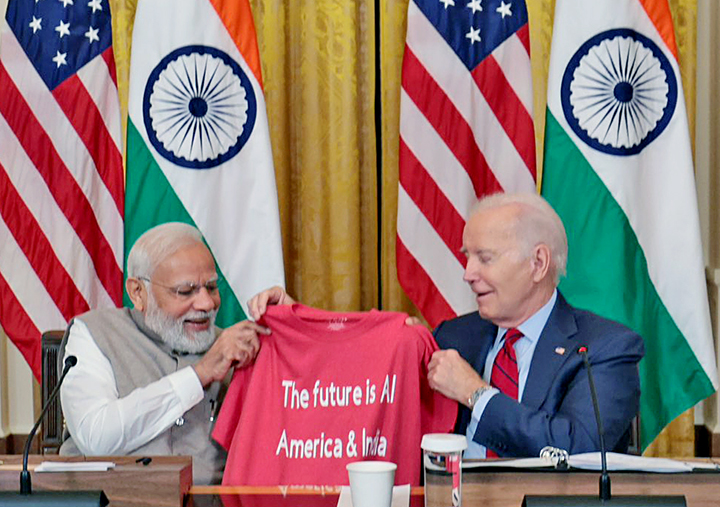The partnership focuses on the key area of technology in semiconductors, critical minerals, space research, advanced computing, artificial intelligence, fiber optics, R&D and more.
New Delhi
There have been few historic visits of Indian Prime Ministers to the United States. One of the most significant in recent decades was Dr Manmohan Singh’s during the period of the civil nuclear deal. The recently concluded State Visit by Prime Minister Narendra Modi has been highly significant as well. The US ambassador to India, Eric Garcetti commented, “I feel that AI is the future—America and India. We had more things that we got done than any other visit in history. This was an exceptional visit. We are now in the deepest and broadest friendship of our entire history.”
The partnership focuses on the key area of technology in semiconductors, critical minerals, space research, advanced computing, artificial intelligence, fiber optics, R&D and more. Micron Technologies Inc will invest $800 million to build an assembly and test facility in India. Applied Materials has announced that it’ll build a Semiconductor Centre for Commercialization and Innovation in India. Through its AI Research Center in Bengaluru, Google is building models to support over 100 Indian languages and working with IISc to support open sourcing of speech data for AI models. India has also signed the Artemis Accord which advances a common vision of space exploration for the benefit of all humanity. Within the area of defence, technology transfer and production of GE-F414 engines is a sharp shift from the past. India will also procure UAVs, allow for deeper defence cooperation, build the India-US Defence Acceleration Ecosystem (INDUS-X) as well as chart a new path to accelerate the co-production of advanced defence industries.
India has also moved to resolve multiple trade differences to deepen bilateral cooperation and strengthening economic relations. The US also intends to open new consulates in Bengaluru and Ahmedabad. For its part, India looks forward to opening a consulate in Seattle later this year and announcing new consulates in the US thereafter. The two countries will work to achieve climate and energy goals under India’s National Green Hydrogen Mission and the United States’ Hydrogen Earth Shot. There is also growing focus on Clean Energy infrastructure and their investments.
On the global stage, India is now the clear voice for peace, sustainable development, dialogue to resolve differences, renewable energy and an inclusive vision for global governance. In the joint session of Congress, the Prime Minister clearly articulated India’s position on a variety of issues that elicited standing ovations. Notably, in reference to the Ukraine conflict and human suffering, he re-iterated India’s position that the current era is “not the era of war”. Further, India’s push for engaging and involving citizens in a sustainable way of life was repeated through the LiFE acronym or ‘lifestyle for environment’. To resolve malnutrition and hunger, and to spread awareness globally, India proposed to declare 2023 as the Year of Millets. To make global governance more inclusive, the Prime Minister also made the case for including the African Union in the G20. It is clear that an India which is growing, which is stronger and more prosperous is a global force for good.
Strategically, it is also important to focus on long-term, bedrock issues of technology, trade, diaspora, education and climate. iCET has been a consequential area of exchange that will benefit both countries for times to come. The defence partnership has evolved from a buyer-seller one to one that is about co-development. The US is now India’s largest trading partner bringing much needed prosperity, employment and development to both countries. Equally, India’s diaspora serves as the people-to-people connect bringing the two countries closer. There is now increasing collaboration on higher education and institutional partnership which is a welcome step. On the climate front, India and the US are committed to a greener future. American influence is crucial to leading the world to a more sustainable future and India’s contribution as the world’s most populous nation and largest democracy will make a considerable difference to the growing challenges brought by climate change.
While India-US relations are on an upswing with growing trust, respect and expanding areas of partnership, naturally there would still be places where we see differently. India hopes and anticipates greater US support with regards to Chinese belligerence on the Himalayan border. The reform of multilateral institutions, specifically the security council would be another area where change would be welcome. We are now in a situation where the most populous country on earth is not a permanent member of the security council which does not augur well for its legitimacy. On the American side, India understands that greater investment
- Rajesh Mehta is a leading international affairs expert. Krishanu Ranwan is a global relations consultant.

